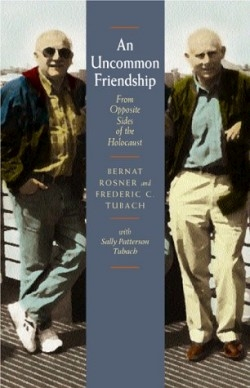An Uncommon Friendship
From Opposite Sides of the Holocaust
The author was born and raised in the Hungarian village of Tab where his parents grew and sold fruit and walnuts. In July 1944, when he was twelve, Rosner, his parents, and ten-year-old brother were sent to the Auschwitz-Birkenau concentration camp. Only Rosner survived and he was sent to Mauthausen concentration camp in September 1944. He was liberated by Allied forces in May 1945 after enduring the horrors of the camps.
Tubach was the son of a counter-intelligence officer in the German army. He lived in the village of Kleinheubach and was a member of the Jungvolk, the boy’s division of the Nazi Youth Movement. He had only to endure a scarcity of food and nighttime air raids that disrupted the family’s sleep.
As adults, Rosner and Tubach met by chance in the San Francisco Bay area in 1983. Rosner was general counsel of a grocery chain and Tubach was a professor of German at the University of California, Berkeley. Tubach’s wife Sally, author of Memoirs of a Terrorist (1996) and a co-author of this book, was a high school friend of Rosner’s wife.
Rosner and Tubach write of their early days in the United States, their struggle to learn English, get an education, and begin their careers. They recount their trip to Germany and Austria fifty years after leaving Europe, where they visited Mauthausen, now a museum, and Kleinheubach, and a trip to Hungary in 1990.
There are moving accounts of Rosner’s liberation and Tubach’s reaction to the war’s final days. Rosner was thirteen and the Nazi reign of terror had left him suspended between life and death. He described his initial mood, not as one of elation, but as a stunned sensation. “There was no energy left to celebrate, only an urgency to find something to eat.”
Tubach was fourteen when American troops entered his village on March 30, 1945. “It was a day of confusion for everyone in Kleinheubach. Some of us felt relieved, others depressed, and most tried to forget. No one wanted to think about what might be happening east of us in a town called Mauthausen where the dying, killing, and torturing were still going on.”
What began as a pleasant, if superficial, friendship between the two men, in time became one of respect and understanding. In An Uncommon Friendship Rosner has attempted to come to terms with a past long suppressed; for Tubach it is a search for redemption.
Reviewed by
George Cohen
Disclosure: This article is not an endorsement, but a review. The publisher of this book provided free copies of the book to have their book reviewed by a professional reviewer. No fee was paid by the publisher for this review. Foreword Reviews only recommends books that we love. Foreword Magazine, Inc. is disclosing this in accordance with the Federal Trade Commission’s 16 CFR, Part 255.

